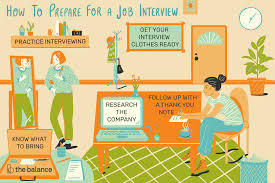A job interview is your chance to demonstrate why you are the ideal candidate for the position and make a strong first impression. Whether you are looking for a new or dream job, solid preparation will significantly increase your chances of success. From company research to outfit selection and answering difficult questions, this book covers all you need to know about preparing for a job interview.
Research the company
One of the most important things you can do before a job interview is to research the company. Hiring managers expect applicants to understand the organization’s goals, objectives, and recent changes.
What to research
- Company background – Visit its website to learn about its goals, both past and current.
- Products and services – Understand the organization’s operations and offerings.
- Company culture – Employee feedback on sites such as Glassdoor might help you understand organizational culture.
- Industry news – Keep up to date on the newest business developments.
Understand the job description
Examine the job description thoroughly to understand the necessary skills and qualifications. Companies look for individuals who meet their expectations; therefore, connect your qualifications to the job description.
Key things to note
- Responsibilities – Be prepared to demonstrate how your previous performance correlates with the obligations of the position.
- Skills and qualifications – Choose the most important ones that the firm is looking for and prepare samples to illustrate them.
- Preferred experience – Emphasize your transferable skills, even if you don’t meet every requirement.
Prepare answers to common questions
Typically, most interviews include both job-specific and broad inquiry. Making forward-thinking responses will increase your confidence.
Common questions
- Tell me about yourself. – Provide a brief summary of your background, qualifications, and experience.
- Why do you want this job? – Discuss the motivation behind your application and your suitability for the position.
- What are your strengths and weaknesses? – Emphasize your strengths and how you overcome your limitations.
- Describe a challenging situation at work and how you handled it. – Respond with the STAR method—situation, task, action, result—in mind.
Plan your outfit
Your look plays an important role in making a favorable impression. Appropriate dress for an interview displays professionalism and respect for the opportunity.
Dressing tips
- Research the company dress code – While smart casual may be appropriate for creative industries, formal business attire is preferred for corporate positions.
- Choose neutral colours – Hues such as black, grey, navy, and white, which are both safe and professional.
- Groom yourself well – Simple elements like neat hair, clipped nails, and polished shoes can have a significant impact.
Practice mock interviews
Practicing with a buddy or mentor will help you relax during the actual interview. Mock interviews allow you to improve your responses, gain confidence, and overcome fear.
How to practice
- Use common interview questions – To boost confidence, repeat the questions aloud.
- Record yourself – Reviewing your responses can help you improve them.
- Get feedback – Review your responses and seek help from a friend or professional coach on areas that need improvement.
Prepare your documents
Make sure you have everything you need ready before the interview. Companies may demand copies of your cover letter, résumé, or work samples.
What to bring
- Multiple copies of your resume – You should have several copies of your resume on hand in case the interviewer asks for one.
- A printed cover letter – If applicable to the job.
- A list of references – Employers may ask for references to corroborate your work ethic.
- A notepad and pen – Will allow you to record your observations during the interview.
Plan your journey
Arriving late for an interview might ruin relations. Map out your route ahead of time to avoid traffic congestion.
Travel tips
- Check the location – Locate the office using Google Maps, then project travel times.
- Arrive 10-15 minutes early – Demonstrates professionalism and timeliness.
- Prepare for delays – and unplanned problems with transit or traffic.
Body language and confidence
Your body language communicates a lot about your attitude and confidence. Even if you are anxious, positive body language can be really beneficial.
Tips for good body language
- Make eye contact – To show interest and involvement.
- Sit up straight – Demonstrates confidence.
- Use hand gestures naturally – Use natural hand motions to convey your passion.
- Avoid fidgeting – Behavior, as it can make you appear nervous.
Follow up after the interview
Send a thank-you note after the interview to express your appreciation and reiterate your interest in the position. This fundamental action may impress the hiring manager.
What to include
- Thank the interviewer – show appreciation for their time.
- Reiterate interest – Briefly describe why the role fascinates you.
- Highlight key discussion points – refer to a specific interview reference.
Final thoughts
Good preparation is the foundation for a good job interview. Your chances of securing the job will improve if you research the company, rehearse responses, dress appropriately, and maintain your confidence. Consider each interview as a learning opportunity; with enough preparation, you’ll be ready to impress any business.

